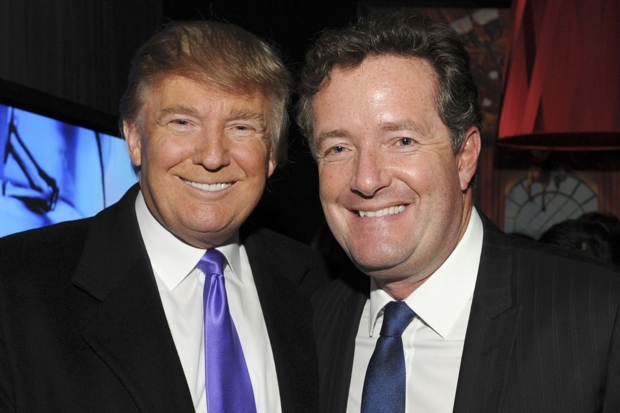Is Donald Trump the Leicester City of US politics, the 5,000/1 outsider who took everyone by surprise? That was Piers Morgan’s opening question to the likely Republican presidential candidate on ITV last night. The obvious response might be that the Donald is more like Chelsea – loads of money, everyone sorts of hates them, some dubious right-of-centre supporters.
The Morgan interview was presumably part of a plan for softening his image, now that he’s won the GOP base and needs to get more of the centre. There was lots of personal stuff – I’m a nice person, he kept on saying, I’m a people person, I love people – but also a strong and powerful one. And clever, too; it’s puzzling how keen he is to always emphasise his intelligence; puzzling because it seems to be revealing an insecurity.
It was his first outreach to the British public, after half a million people with nothing better to do with their lives signed a petition calling for him to be banned from our dreary, cake-filled island. There were many tributes to our country, an ally so loyal it even got involved in stuff it shouldn’t have done, like Iraq (yep). To Britain, he said, ‘you have a great friend in need’ when he rules America and a ‘great ally in president Trump’. Strangely, with all this talk of a special relationship being renewed, despite earlier hiccups, what wasn’t mentioned was that he’s half-British, his mother Mary McLeod being born on the island of Lewis. In fact, having four non-American grandparents makes Trump the most immigrant-ish of Presidents, apart from Andrew Jackson.
People will of course complain that the interview is too soft, but then as Trump likes to point out, he’s not a politician, he’s a celebrity. Gone are the days when Richard Burton would spend three inebriated days on a yacht with a journalist; now no celebrity will give any interview without a list of questions first and an assurance there will be no difficult ones. Did we find out anything more to him, apart from the fact that he doesn’t really give a monkey’s what people think of him? (Which is, of course, the main attraction.)
The most convincing explanation for Donald Trump I’ve read is here, by educational psychologist Andrew Sabisky, who notes that the whole phenomenon can be explained through the medium of wrestling, Trump being a member of the WWE hall of fame. As he said: ‘Once upon a time, audiences would dutifully cheer the heroes (like Hulk Hogan) and boo the villains (like Ted DiBiase, whose “Million Dollar Man” gimmick was in many ways a parallel to Trump’s real-life persona). Since the late 1990s, this dynamic increasingly broke down, and, as audiences grew older and more mature, they began to openly cheer for villains whom they had grown to love. To keep audiences onside, a trick of the modern wrestling era is to break the fourth wall: to give off subtle little hints that you, as well as the audience, are very well aware of the true nature of wrestling.’
That’s the nature of Trump’s campaign so far: no one knows if he believes what he says, or if it’s a joke, or somewhere in-between; never mind whether he’s a racist or sexist, or even a Republican. Is it just a role he’s playing?
Sabisky concluded: ‘Voters not in love with Trump the showman will be far more inclined to trust Trump the executive if they know he doesn’t quite believe of all his own absurd hype, and by giving them hints in that direction, he is starting a slow process of suggestion and persuasion that he believes will pay off further down the road towards the presidency.’
I sometimes wonder if the whole thing is half a joke designed to wind people up, the troll to beat all trolls.







Comments